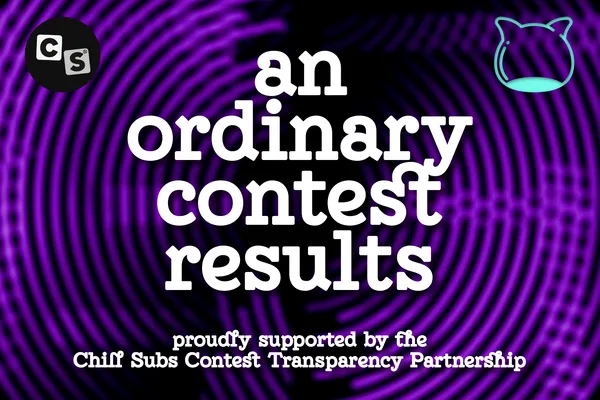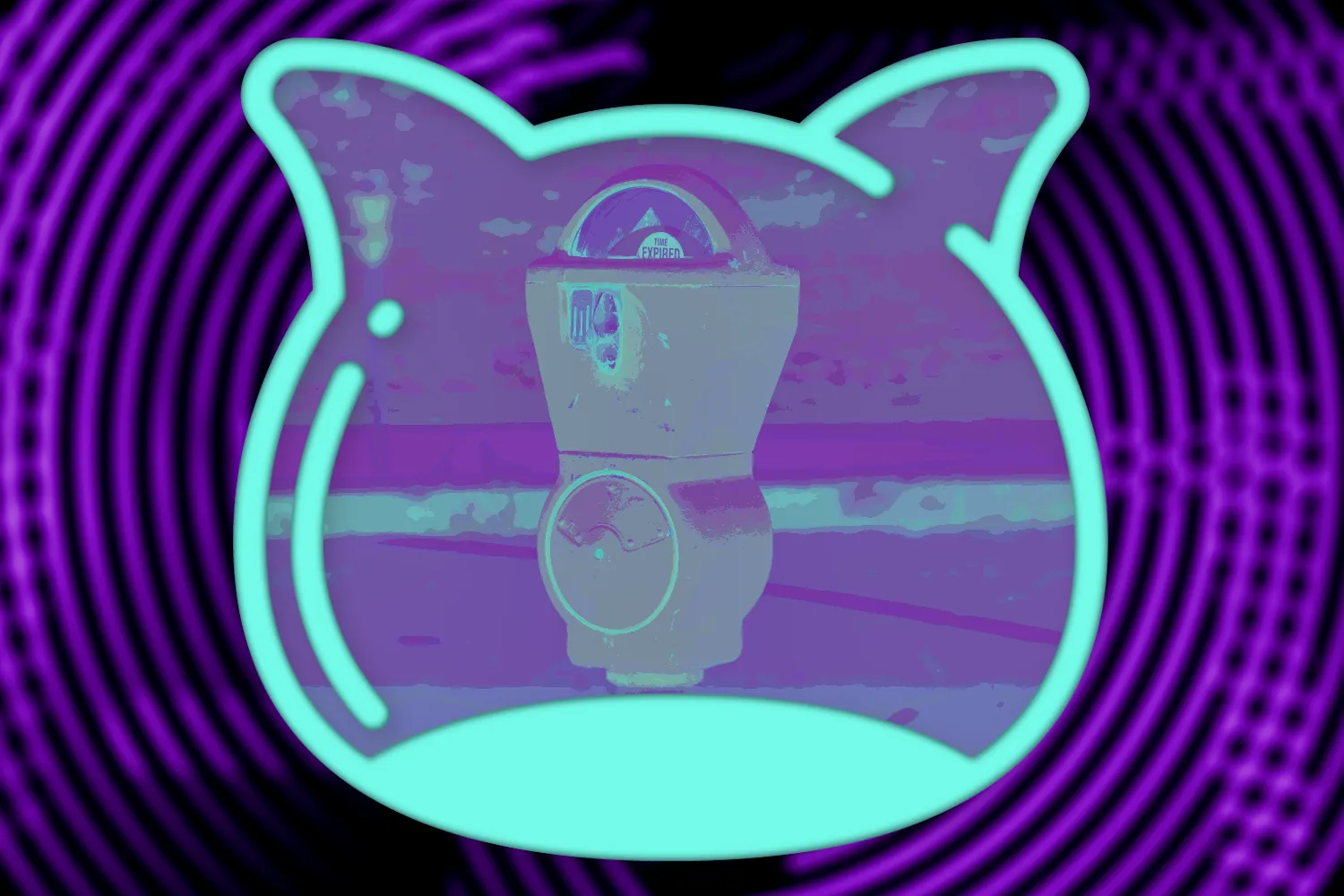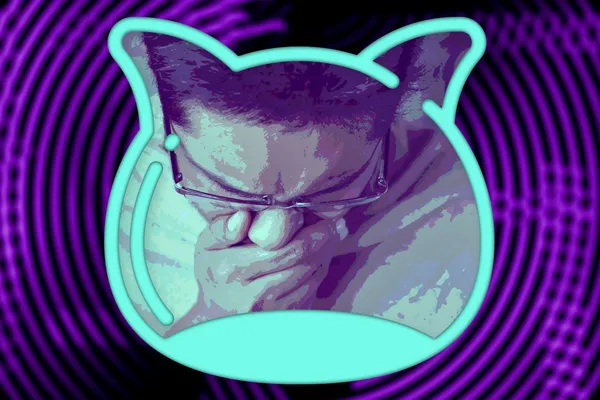
An ordinary contest results
truly extraordinary
by Zoe Carver

Today—like most days—the amnesiac was really and truly in a pickle. He was late, though he kept forgetting what for, and as he drove—on muscle memory alone, for he couldn’t remember taking his driver’s test—he’d sped past little Maggie McGill and almost hit her straight on. It had taken him two circles around the block to find parking, and once he finally did, it wasn’t at one of the parking meters that took normal things, like fingernails or strands of hair. The parking meter wouldn’t even accept his money. Instead, it demanded his memories.
“Shit,” The amnesiac said. This felt familiar, like it had happened to him before. He got deja vu at everything these days. He thought about feeding the machine his drive into town, but he needed to remember where he parked once the day was done.
A woman passed him, with short black hair and the traces of a snaggle tooth once covered by braces, but slowly starting to re-emerge. They made eye contact, deja vu. Again.
“Sorry to bother you, ma’am. Do you have any spare memories?”
“Of course,” the woman laughed, crinkling the skin around her eyes. She placed her lips to the parking meter. Mouth to glass, she murmured into it. “My sixth birthday party, my father brought out a cake with sparklers. It burned me, and I screamed.”
The parking meter whirred, eating her words, and then, with a click, deposited the receipt. The amnesiac put the token on his dashboard. The memory had bought him three hours, which he hoped would be enough for whatever it was he was supposed to be doing. The woman watched him with that pleasant, vacant expression people always get when they’re forgetting something.
“Thanks a million,” he said and meant it.
“Anytime, Steven.”
As he continued down the sidewalk, he frowned and thought, That’s funny. Who’s Steven? Then forgot the thought like it was never thunk at all.
He walked down the boulevard to the address he’d found on a sticky note half-stuck to his forehead when he woke up. It was a typical steel office building. The amnesiac tapped the button for the elevator, his fingers knowing instinctively which button to press. With the sour mechanical whirr of a machine powered by wires—not memory—the elevator brought him up to the thirteenth floor.
“Carol, he’s here,” an assistant called automatically as the metal doors slid open. The office was busy with bodies running back and forth in tight grey suits and little grey glasses. Nobody seemed too concerned about his presence, despite the fact that he looked terribly out of place in his worn-down jeans and faded t-shirt.
Carol, or the woman he assumed to be Carol, rounded a corner and shook his hand.
“Hey there,” her face had a certain pinched quality to it, like what he expected a middle school vice principal to look like. “I guess I’m on integration today, huh?”
“I guess,” the man responded, having no idea what she could possibly be talking about. Carol led him into a boardroom with sandy beige carpet and matching chairs. He sat down on one end, she on the other. The long mahogany table stretched between them like a soundless ocean. Outside the floor-to-ceiling windows, the city was cast in the faint glow of morning. The amnesiac tried to remember which city this was, but couldn’t.
“What’s your name?” Carol asked boredly, like she’d asked him a thousand times before. She was holding a clipboard and a dainty red ballpoint pen.
“I don’t know,” the amnesiac answered honestly. He thought maybe he should be troubled by the fact that he didn’t know, but he was terribly tired of feeling troubled. All he wanted was a cool, glacial sleep.
“Alright, and what did you do last night?”
“I’m not sure.”
“What did you do this morning?”
“I woke up and found a sticky note telling me to come here at nine o’clock, and so I did.”
“It’s 9:45.”
“I slept in.”
“Do you know your birthday?”
“No.”
“Do you know your mom’s name?”
“No.”
“Do you know why you don’t remember any of these things?”
“I must’ve sold them. Otherwise, I’d remember, wouldn't I?”
Carol maybe-smiled, her tight skin drawn slightly tighter, “Do you know where you are?”
“101 North Memorial Drive,” he recited what the sticky note had proclaimed.
“Which is?”
“How on earth should I know?”
It was the day after the last, and the amnesiac was really and truly in a pickle. He was running late, of this he was certain, and blew by little Maggie McGill with such closeness he could’ve reached out and grazed her. He circled the block twice before finding a parking meter that blessedly accepted two fingernails as payment.
He found his way to the address that the sticky note had told him to go to—101 North Memorial Drive—clicked the button up to the thirteenth floor, and shook the hand of a woman with an acetic face.
“I’m Carol,” the woman said.
“Nice to meet you,” the amnesiac responded.
Carol led him into a boardroom, and after going through her answerless questions, she clicked on a slideshow. Tight grey shades whirred down to cover the glossy windows, the city shrouded in shadow. On the first slide, a slogan read: ‘Your Past Made Future.’
“What’s in a memory?” Carol read from her cue card. Her inflection was half-hearted. “In a self-conomical society, our world runs on people. And what’s more human than memory?”
“I don’t know,” replied the amnesiac. Carol glared at him. The question was supposed to be rhetorical.
“By giving up a piece of your past, you can afford a brand new you.” The slideshow clicked to a picture of a mansion with a jacuzzi; a picture of a private jet; a picture of a diamond necklace around a smooth, pale neck. “Memories are a lucrative and near bottomless resource. Memories are ten times more potent than a finger, and forty-seven times more potent than a lock of hair. In a capital-selfist world, memories are the most cost-effective part of yourself to give up.” The slideshow displayed children cheering. “But there are certain memories you can’t give up.” The slideshow switched to a stoic-looking family. “Certain memories your brain won’t let you forget.”
The people in the slideshow looked strangely familiar, like characters on a TV show he must’ve watched as a kid.
“Can you guess which memories, Steven?”
The amnesiac frowned, “Who’s Steven?”
The amnesiac was once again, as perhaps was his constant state of being, really and truly in a pickle. Maggie McGill waved her arms like a madman as his car glided by her, but he couldn’t stop, for he was already running late. Circling the block thrice, he finally found a parking spot, and just his luck, it was a memory-eating parking machine.
“Excuse me, ma’am,” he accosted a passerby with traces of a snaggle-tooth. “Got any spare memories?”
“Of course, Steven,” she said, placing her lips to the parking meter. “Age thirteen, I locked myself in the girls’ bathroom at school, and the lock stuck. My math teacher had to break down the door to let me out.”
The parking meter hummed sweetly before depositing a receipt for four hours.
“Thanks a million.”
Carol tapped her clipboard impatiently as he strolled in, “Would it kill you to be on time?”
“I’m sorry, I slept in,” the amenisiac apologized. “It’s nice to meet you.”
Clearly perturbed, Carol led the amnesiac into the boardroom. She asked her questions and she showed her slideshow. The picture of a family was once again displayed on screen. “Can you guess which memories a man can’t sell?” She questioned.
“Your present?” He shrugged. It felt right. He must’ve taken a self-nomics class at some point, maybe in college, though he couldn’t remember what college or if he’d gone to college at all. “You can’t sell the right-now.”
“Correct,” Carol seemed unimpressed. “Your present is too potent; the brain protects it. But your present could power houses. It could power cities. If a handful of people gave up their present, worlds could be run on the sacrifice…” She trailed off, her expression tart. “Unfortunately, the body doesn’t like to forget.”
“Too bad,” the amnesiac murmured unconvincingly.
“So,” Carol asked flatly, “How did you do it?”
“Huh?”
“How did you sell your present?”
“How did I what?”
“This is pointless,” Carol called out, frustrated.
A grey voice on an intercom responded, “Careful, Carol.”
“Can we just torture him already?”
“No, Carol.”
“It’s not like he’ll remember anyway.”
“Continue with the questioning. We’ll try torture tomorrow.”
“That’s what you keep saying,” she huffed and returned to her interviewee. “Anyway, what’s the last thing you remember?”
Every day for as long as the amnesiac could remember, which wasn’t very long at all, he had really and truly been in a pickle. Every day, he woke up with a sticky note stuck loosely to his sweaty forehead, and every day he drove downtown to a steel office full of strangers. Every day, he mowed past Maggie McGill and every day, he let Carol poke and prod him in the hopes he would give way. Every day, Carol grew more frustrated, wishing she could lay him on a table and cut open that thin layer of skin across his forehead and dig into his pink, fleshy brain. If only he weren’t so singular. If only they knew someone else who knew his secrets.
Today, like always, like forever and ever and ever, the amnesiac was really and truly in a pickle. As he raced into town from that stale and shadowy house, he once again almost ran over Maggie McGill. She wasn’t just on the side of the road, though; she was in the center, staring down his tiny grey car like the devil herself. That’s odd, the amnesiac thought, and kept driving.
“We’re going to try something different today,” Carol instructed.
“Today?” The amnesiac asked, confused. He didn’t like this woman with the bitter, pinched face. He was starting to sense she didn’t like him either. “I just met you.”
Carol didn’t bother responding. Instead of a boardroom, she took him into another office, with a converted MRI machine and a table with straps. The amnesiac didn’t bother struggling, just got onto the table as Carol placed her lips to the side of the machine and murmured, “Summer by the beach, alone in the waves, riptide at dawn.”
The machine whirred to life, glowing like a beacon, like a cave, like the mouth of a monster about to swallow the amnesiac whole.
The pickle he was in was growing sour and moldy. The amnesiac was late once again, and as he plowed down the street, Maggie McGill stood in the center with a bright hand-painted sign that read: PULL OVER!
The amnesiac frowned and thought, That can’t be for me. But Maggie McGill was waving her arms high over her head, pointing at his car, and mouthing, YES, YOU!
The amnesiac pulled over.
“Thank GOD,” Maggie McGill huffed, coming up to his rolled-down window.
“Is something wrong?” The amnesiac asked, peeved at this odd girl in the middle of the road.
“Steven, you have to stop going downtown.”
“Stop?” He asked. “I’ve never gone downtown before. At least, I don’t think I have.”
Maggie McGill’s expression turned stormy, a cloud passing over her lacquered skin. She set her eyes on the amnesiac and, with dreadfully intense directness, commanded, “No more driving into town, no more passing me by. Leave your car. Follow me.”
The amnesiac paused. He didn’t know this girl with the wild eyes. But he also didn’t know the handwriting of the sticky note that appeared on his forehead this morning, telling him to go into town. Two paths, divulging, each stranger than the other.
Better to trust an angry girl than a red swatch of ink. The amnesiac followed Maggie McGill out of his car and into the woods.
“I’ve been trying to wave you down for weeks,” Maggie grunted as they traversed fallen logs. Bushes brushed their legs, and thickets threatened to scratch and strike. The path was wild, yet the amnesiac’s feet seemed to always find the right place to land. He wondered if he’d been here before. “But you’re always in such a rush.”
“I’m sorry,” he said, though he wasn’t really, because he couldn’t remember having ever driven past Maggie McGill.
Maggie stopped. They were in a clearing; the sun dangled between the trees like golden thread, leaves as bright as stars backlit by its grin. “No,” she frowned like a hurricane. “This is my fault.”
“What do you mean?” The amnesiac asked, a question he was growing oh-so-tired of asking.
“I helped you sell your present.”
“I sold my present?” He looked alarmed. That was impossible, he was fairly certain.
Maggie nodded, “We didn’t think it would work. I didn’t know it would be possible to sell a name… I mean, fingers sure, and toes, and maybe siblings, but a name. It’s everything you are. And we sold it.”
“My name is my present,” the nameless amnesiac rolled the thought over his tongue. It made sense, in an awful, twisted way.
“And your future,” Maggie responded miserably. “It’s all gone.”
They paused in silence, taking in the stillness of the scene. Both looked terribly defeated. Steven, or rather, the man who had once been Steven, was right next to Maggie, finally—finally—and yet, he was unreachable. He was a shell. He’d sold himself for a future they’d never even get to see. She lost him, and lost their future too. There was no future without the present, without the you that strings it all together. The trees around them swished in the quiet. Leaves falling like they’d always been made to fall.
From the hush, a murmuring woosh in the distance. The stir of a motor, the hum of gas. The horrible grind of gears and metal. Bushes, being run over by thick rubber wheels, and the hiss of an exhaust pipe. A large back van appeared from the thicket like a harbinger, the lone black horse at the start of the cavalry.
A woman with a pinched face stepped out of the car. “Steven, you’re late.”
“Who the hell are you?” The amnesiac asked.
Carol rolled her eyes. Maggie McGill’s stormy face was starting to thunder.
“I knew there must be someone out there who knew about him.” Carol laughed, and the sound bubbled out of her like a cough. “To think, he’d been driving past you every day. Yes, yes, we’ve been keeping tabs.”
“I won’t tell you shit,” Maggie spat.
Carol grinned, the first real grin she’d spared in weeks, her tight little lips almost disappearing into the sharp creases of her cheeks. “You don’t have to, dear. You can still remember. Finally, someone we can torture.”
Carol, with the amnesiac and Maggie in the back of her pristine black van, was really and truly in a pickle. She was circling the block around 101 Memorial Drive and for the life of her could not find any goddamned parking. A little awkward with two prisoners in the back. Pseudo-prisoners. Captees.
The amnesiac, Steven, as he might’ve once been known, was staring blankly out the window, trying to remember whose car he was in and how exactly he had arrived at this point in the day.
Maggie McGill, with her cloud-ridden face and head full of secrets, was trying desperately to maneuver her zip-tied hands to the door latch. All those weeks spent trying to wave Steven down, all those months spent mourning him, all those years they spent planning a life together; all that time could not end this way. Torture was one thing. Giving answers to Carol and her company of dream-catchers and memory-takers was another. It would be apocalyptic.
Suddenly, a woman with the faint traces of a snaggle tooth darted out into the road, and Carol slammed hard on the brakes. The momentum was just enough to launch Maggie forward, for her hand to catch on the latch, click away the lock, and open it with a tug and then a push. As Carol screamed, “WATCH IT,” Maggie rolled out of the vehicle, onto the street, and to the nearby parking meter.
She couldn’t risk giving Carol any answers; it would be the breaking point that brought this capital-selfist city teetering into destruction. A world where you could sell yourself, all of yourself, was not a world she could live in. She saw it happen to Steven. She didn’t ever want to see it happen again.
There was only one way to ensure the answers stayed buried in her head, through torture or MRIs or whatever may come her way.
She placed her lips to the parking meter, and quiet as a dove, whispered, “I am Maggie McGill.”
The machine whirred to life, eating Maggie’s name and Maggie along with it. Her eyes glazed over, and the storm of her expression passed into pleasant, sunny skies. The parking meter clicked, depositing her receipt. Parking, good for four years, nine months, and six hours. A self-worth of parking.
“This is for you,” the newly born amnesiac nodded towards the woman with the once-snaggletooth, who had made it safely out of the path of Carol’s van. The woman seized the receipt, which the amnesiac could not touch, as her hands were still zip-tied.
“Thanks, Maggie. In this town, this is worth more than gold.”
She sauntered off, right as Carol came out of the van to place the new amnesiac back in, unaware of what had just transpired between the girl, the parking meter, and the secrets that had paid for her parking.
In the back seat, the two amnesiacs looked at each other, as if they were looking at each other for the first time. Maybe they were. Easy, simple smiles brightened their lined faces. The world was new and for the taking. The world was bright as a forest, as loud as a riptide. The world wanted these selves so terribly, but they’d already given all the self there was to give. Nameless as newborn babes, the amnesiacs had nothing to offer but their bodies, fettered by scars they couldn’t remember receiving. Worn as t-shirts well-loved, as parking spots always used.
This week’s ad slot was purchased by friend of Foofaraw, Evan Passero, in support of Elevated Access—a non-profit organization that enables people to access healthcare by providing flights on private planes at no cost, whose volunteer pilot network transports clients seeking abortion or gender-affirming care across the United States.
Foofaraw will match up to $300 in donations to DIFFA Dallas, Elevated Access, and Denton Community Food Center through the remainder of 2025.


